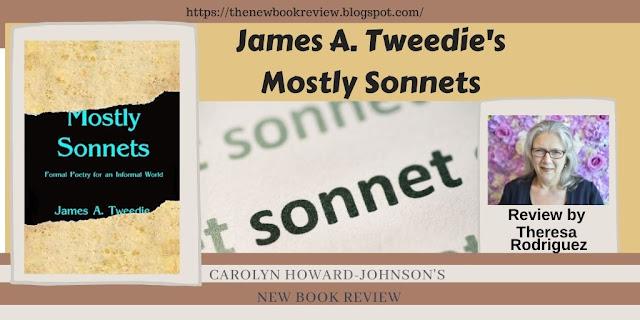The Sonnet Queen Reviews James A. Tweedie's Book of "Mostly Sonnets"
Mostly Sonnets
Subtitle: Formal Poetry in an Informal World
Author: James A. Tweedie
Publisher: Dunecrest Press
ISBN: 978-1945539329
Released July 2019
$9.95 (Paperback) $2.99 (Kindle)
67 pages
Available on Amazon.
Reviewed by Theresa Rodriguez
As a fellow sonneteer I felt like I was reading the words of a kindred spirit when I read James A. Tweedie’s Mostly Sonnets: Formal Poetry for an Informal World. Tweedie is a very fluid writer with a clean, clear, expressive style, which grabs ahold of you with its immediacy and beauty of execution. What is most striking is the mixture of Christian belief intermingled with an honesty of thought, never coming across as sermonizing, but expressing a faith-filled wonder and appreciation for the natural world and the place of the intelligent believer within it.
In “For My Beloved,” the closing couplet summarizes a sonnet on communion, or the Eucharist:
“A sacramental mystery divine
To taste that I am Yours, and You are mine.”
In “Love that Lasts” we are treated to such phrases as “flame-impassioned kiln of lust;”“Incendiary fireworks of heart/And thigh;” and “faux-felt, fickle love” which is “temporal and ephemeral at best.” The closing couplet brilliantly summarizes the contrast of lust versus true love:
“True love is not based solely on the thrill,
But reaffirmed each day by force of will.”
In Poem IV of the “Poems of Hibernia and Caledonia” (“To the Unknown Scribe of the 8th Century Book of Kells”), we learn of the scribe:
"He transcribed scripture and illumed each text
With intricate designs infused with prayer;
Forsaking this world’s kingdoms for the next.”
One of my favorites is “When God dies,” which is a powerful antidote to atheism:
“The silent echoes of a stillborn sun
Portend the doom of uncreated day,
As once-knit atoms come unspun
And time implodes in random disarray.
Now-soulless life unbreathes its final gasp,
Unsuffering in meaningless distress,
As darkness holds the cosmos in its grasp—
Imbued with mindless, vapid pointlessness.
Abandon hope, all ye who enter here,
For separated from eternity,
Love, truth, and beauty fade and disappear,
The hapless victims of Modernity.
A universe that’s empty, formless, void,
Is all that’s left when God has been destroyed.”
In Mostly Sonnets we are also treated to a set of three love sonnets “In an Antiquated Style;” a pair of sonnets about the Seven Wonders of the Ancient World; a sonnet about treading “The Pilgrim Path,” where “We must cross our daily Rubicon;” a sonnet about humpback whales; and a powerful reflection in “On Regret,” where the author is reflecting on his life and the choices of the past:
“Although I have regrets, it’s far too late
To undo what I did so long ago.
Perhaps it’s best to bless and concentrate
The past to God, and then just let it go.
And yet how nice it would have been, somehow,
To know back then the things that I know now.”
What I appreciate most is Tweedie’s honesty when it comes to dealing with matters of his own faith. In the sonnet “What If” he asks a series of rhetorical questions about the possibility of “faith proven false,” opinions possibly “found to be in error on review,” and the chance that “…all that I’ve held certain [is] turned unclear.” The final couplet sums up his believing heart perfectly:
“Take note: My faith in Jesus remains strong,
But as for all the rest I could be wrong.”
I have found throughout the book that his closing couplets are very strong and have a truly musical flow to them— as do the poems themselves, full of lyrical beauty and many well-articulated truths.
Other topics such as a rural Christmas, the Black Death, a winter thunderstorm, a whale watch, and issues of faith provide a variety of reading pleasure. This was a truly enjoyable reading experience. I would recommend Mostly Sonnets to anyone who loves the sonnet form and would enjoy the combination of finely-written poetry with an honest, religious aesthetic sense.
Find out more about James A. Tweedie at https://classicalpoets.org/james-a-tweedie/
More About the Reviewer
Theresa Rodriguez is the author of three books of poetry: Jesus and Eros: Sonnets, Poems and Songs (Bardsinger Books, 2015), Longer Thoughts (Shanti Arts, 2020), and Sonnets, a collection of sixty-five sonnets (Shanti Arts, 2020). Her work has appeared in such journals as The Scarlet Leaf Review, The Wilderness House Literary Review, Spindrift, Mezzo Cammin, The Wombwell Rainbow, Serotonin, The Road Not Taken, and the Society of Classical Poets Journal. Her website is http://www.bardsinger.com, where you can view videos of her performance poetry and find information about her books. Follow Theresa on Instagram and Twitter @thesonnetqueen.

This blog is a free service offered to those who want to encourage the reading of books they love. That includes authors who want to share their favorite reviews, reviewers who'd like to see their reviews get more exposure, and readers who want to shout out praise of books they've read. Please see submission guidelines on the left of this page. Reviews and essays are indexed by genre, reviewer names, and review sites. Writers will find the search engine handy for gleaning the names of small publishers. Find other writer-related blogs at Sharing with Writers and The Frugal, Smart and Tuned-In Editor.
Labels: Christian poetry, Dunecrest Press, James A. Tweedie, sonnet couplets, The New Book Review, The Sonnet Queen, Theresa Rodriguez


0 Comments:
Post a Comment
Subscribe to Post Comments [Atom]
<< Home